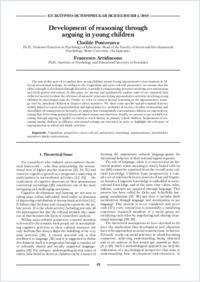Development of reasoning through arguing in young children
Haute École Pédagogique BEJUNE
- Pontecorvo, Clotilde ORCID Sapienza University of Rome, Italy
- Arcidiacono, Francesco ORCID Université de Neuchâtel
- 2010
Published in:
- Культурно-Историческая Психология / Cultural-Historical Psychology. - 2010, no. 4, p. 19-29
Vygotskian perspective
socio-cultural perspective
reasoning
argumentation
preschoolers' narratives
family conversations
English
The aim of this paper is to analyze how young children reason during argumentative conversations in different educational settings. According to the Vygotskian and sociocultural perspective, we assume that the child's thought is developed through discourse, especially during learning processes involving peer interactions and adultguided discussions. In this paper, we present and qualitatively analyze some of our empirical data collected in order to show the relevance of narrative processes during argumentative activities involving young children in educational contexts. Firstly, we refer to counterfactual reasoning as the argumentative strategy used by preschool children in disputes about narrative. We show some specific spatialtemporal features, mainly linked to a need of generalization and logical bases (i.e. authority of sources, rituality of situations, and plausibility of consequences). Secondly, we analyze how during family conversations children use practical reasoning that derive from parental discourses about norms and directives. Finally, we present a case in which reasoning through arguing is applied in school to teach history to primary school children. Implications of reasoning among children in different educational settings are discussed in order to highlight the relevance of argumentation in school and family activities.
- Language
-
- English
- License
- CC BY-NC
- Open access status
- gold
- Identifiers
-
- ISSN 1816-6435
- Persistent URL
- https://folia.unifr.ch/global/documents/312189
Statistics
Document views: 110
File downloads:
- kip_2010_4_Pontecorvo_Arcidiacono.pdf: 223
